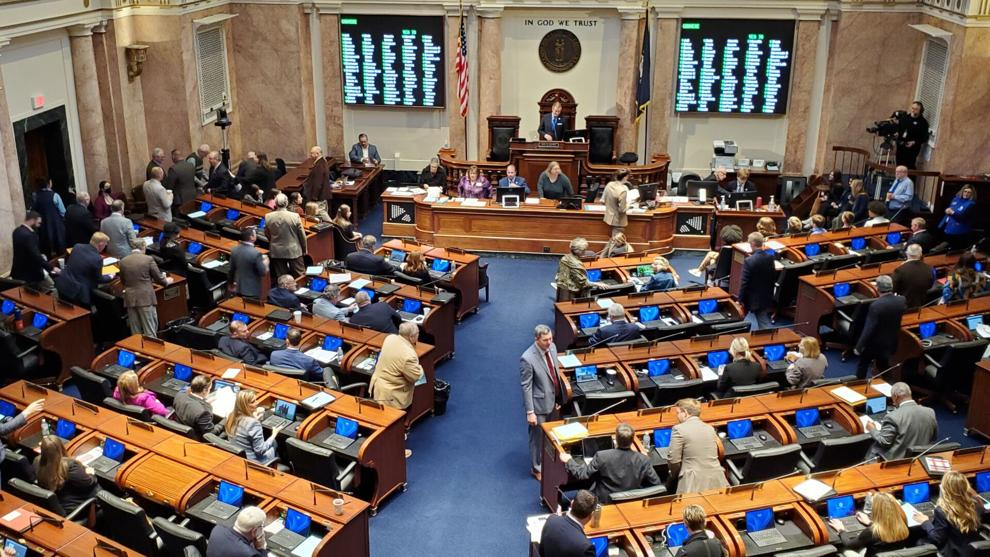Bill would remove required lunch breaks, rest periods for Ky. employees
Published 3:30 pm Thursday, March 7, 2024

- Kentucky Today file photo
|
Getting your Trinity Audio player ready...
|
By: Liam Niemeyer
Kentucky Lantern
Employers in Kentucky would no longer be required to give employees a “reasonable” amount of time for lunch or rest breaks under a committee-approved bill passed Wednesday by Republicans.
HB 500, sponsored by Phillip Pratt, R-Georgetown, would repeal state statutes that require lunch breaks between three to five hours into a work shift and rest periods every four hours. Additionally, the bill would:
- Prevent employers from being punished for not paying minimum wage or overtime pay when an employee is traveling to and from a workplace.
- Prevent employers from being punished for not paying minimum wage or overtime pay for activities a worker does before or after a worker’s “principal” work activity.
- Eliminate a state statute requiring employers to compensate employees with overtime pay on the seventh consecutive day of work for those who are requested to work at least 40 hours a week.
Pratt told the House Small Business and Information Technology Committee, which he chairs, that the bill would clear up confusion that some businesses he’s talked with have in navigating the differences between state and federal law on lunch and rest breaks. Federal law doesn’t require employers to offer lunch or rest breaks, and only short rest breaks up to 20 minutes if offered by an employer are counted as on the clock.
“You have federal law which says you must do this, then you have state law that says you got to do that. And to run afoul of them becomes very easily, very unintentionally,” Pratt said.
Yet labor groups, such as the Kentucky State AFL-CIO, and officials with the Kentucky Education and Labor Cabinet expressed strong concerns or opposition against the bill, saying the legislation could put at risk longstanding wage and workplace protections for Kentucky workers.
The GOP-controlled committee passed HB 500 on a party line, though some Republicans expressed reservations or concerns about the potential unintended consequences of the legislation.
Dustin Pugel, policy director at the progressive think tank Kentucky Center for Economic Policy, said the bill would force employers to decide whether to give employees a lunch break or “force workers to juggle eating while on the job.”
“We as a state put these protections in place for a reason. And those reasons have not changed since then,” Pugel said. “Repealing these guardrails will make work more dangerous by depriving workers of time and for food and rest, incentivizing them to travel too quickly to get to their job sites and discouraging them from taking proper precautions at the beginning of the shift.”
Pugel said the bill could potentially deprive workers of pay when, for example, a factory worker is putting on a hazmat suit before handling dangerous chemicals or a school bus driver is checking over the bus before driving it.
Duane Hammons, director for the Kentucky Division of Wages and Hours, told the committee the administration was worried about the “potential erosion” of “critical” workplace standards that have been in state law for decades, one of the laws since 1958.
“These decade-long standards we have are in place for our safety, mental and physical health of all Kentucky workers,” Hammons said.
The minority of Democrats on the committee who voted against the bill echoed the concerns of labor groups. Rep. Rachel Roberts, D-Newport, asked Pratt, who owns a lawn care and landscaping company, if he had consulted the Labor and Education Cabinet, labor groups or his own employees about the bill.
Pratt said he resented any implication that he had filed the bill to help himself. He said the Labor and Education Cabinet had reached out too late Tuesday afternoon to talk about the bill, which was “a tad bit short notice.”
“I did it because of businesses in Kentucky, to help them — not myself,” Pratt said.
Roberts called HB 500 a “very, very dangerous piece of legislation” that could lead to more errors in stressful, high-stakes jobs such as first responder.
“What this is doing is asking our constituents to work harder and longer for less pay,” Roberts said. “That less pay will lead to less payroll taxes.”
Pratt earlier this month also presented a contentious bill loosening child labor laws that the Kentucky House of Representatives has approved. That bill would allow some teenagers to work longer and later hours than what’s currently allowed by state law.
Pratt told reporters after the committee passed his bill that its goal is to make state law mirror federal law. He described as“ludicrous” critics’ suggestions that an employer in today’s work environment with numerous job vacancies wouldn’t offer employees a lunch break. Pratt declined to name the companies that reached out to him requesting the measures in HB 500, saying the companies wanted to remain anonymous.
Rep. Ryan Dotson, R-Winchester, told Pratt he was worried about potential unintended consequences that could hurt first responders and firefighters but still voted for the bill to advance.
Pratt told reporters any unintended consequences in the bill would be dealt with.
“Bills always have unintended consequences,” Pratt said. “We’ll try our best to make sure this does not have unintended consequences.”




